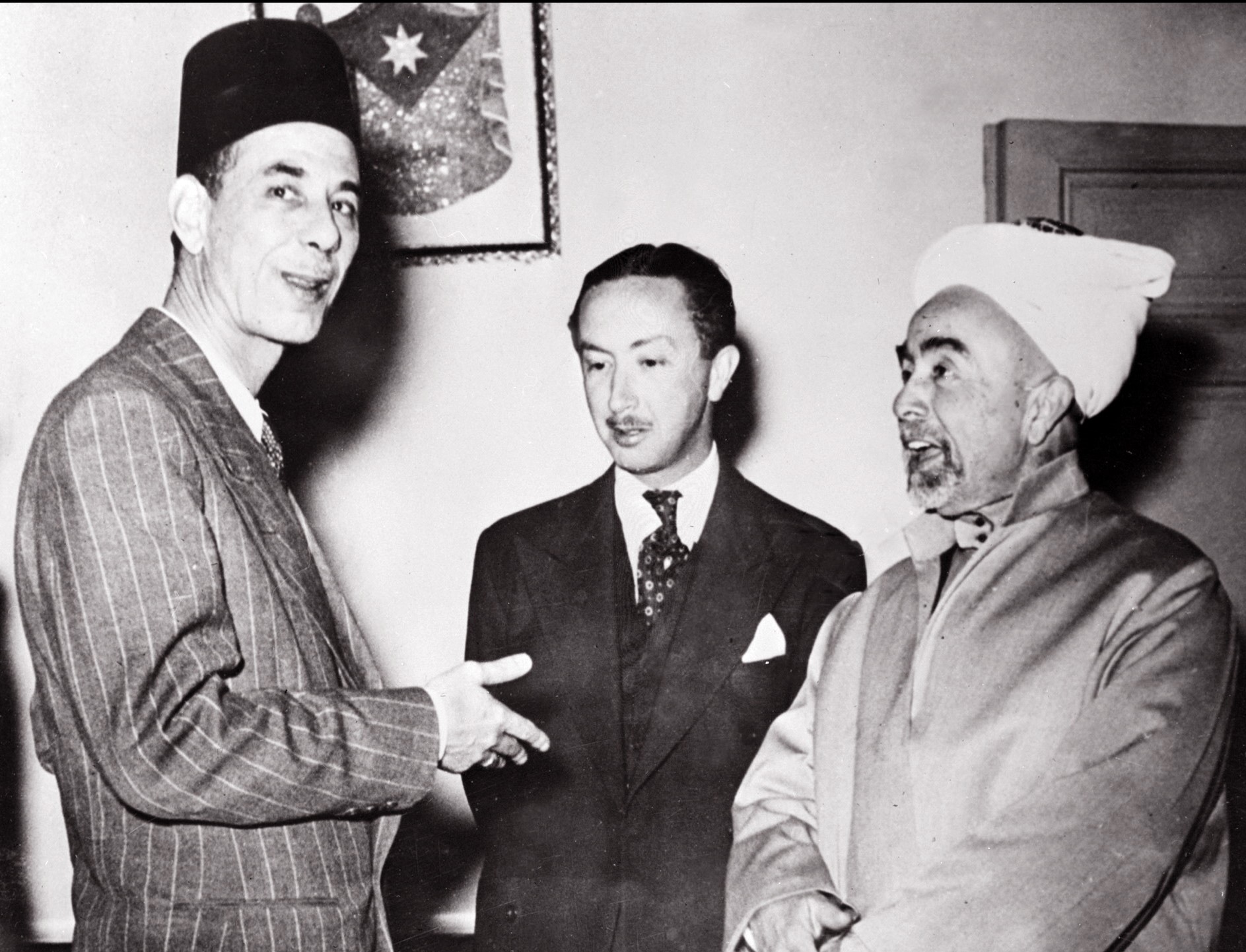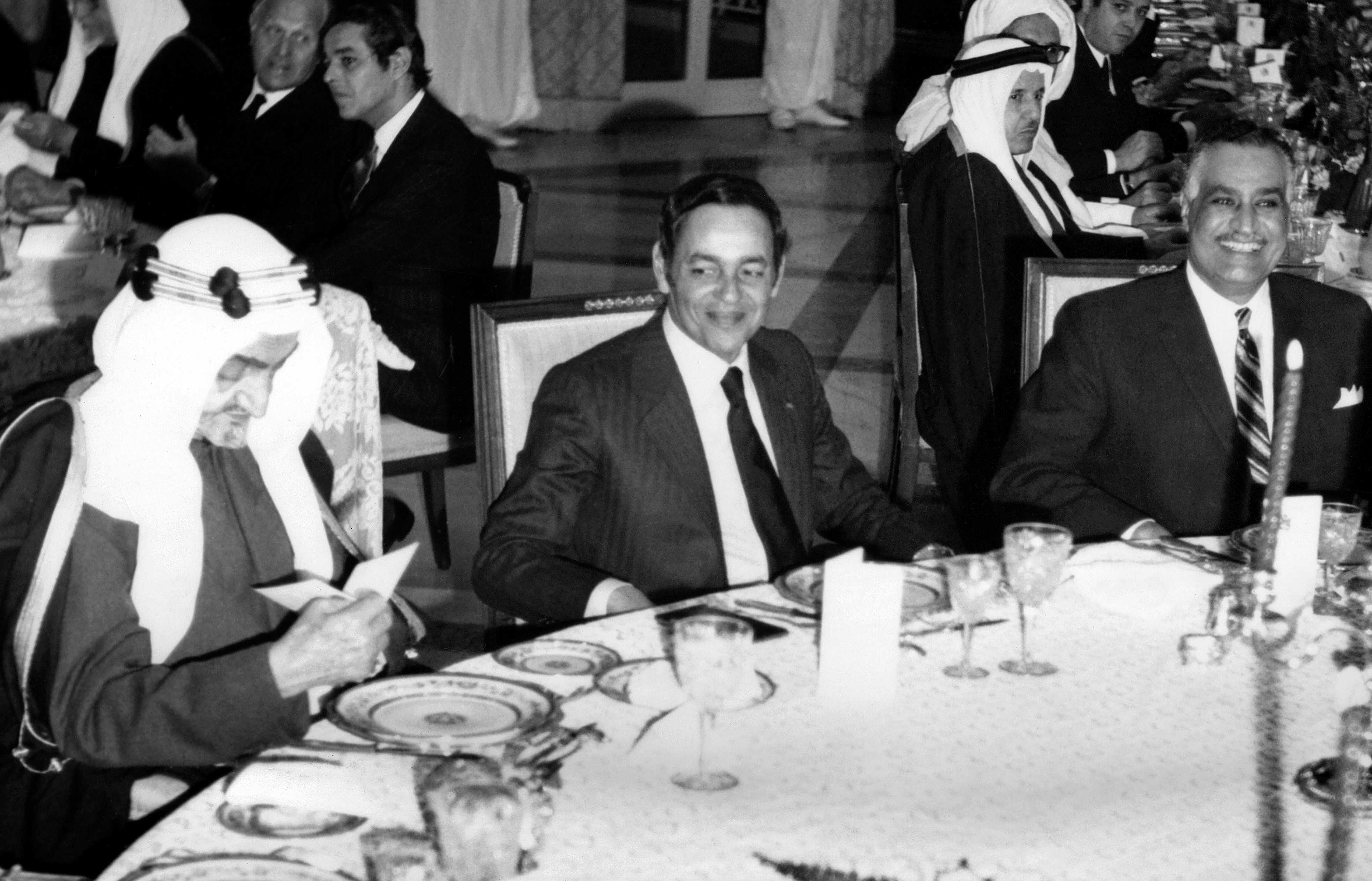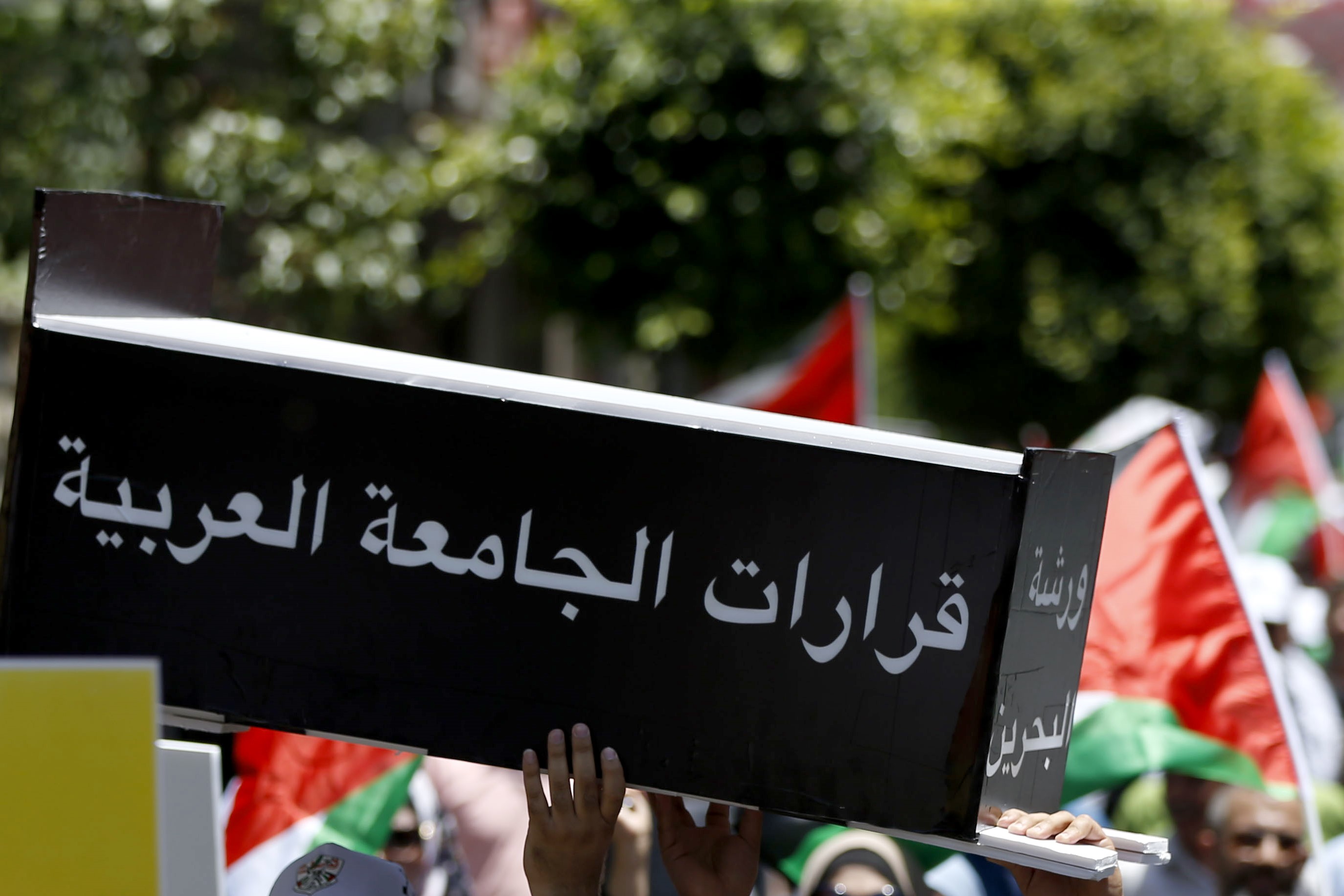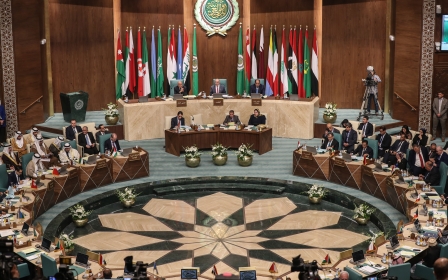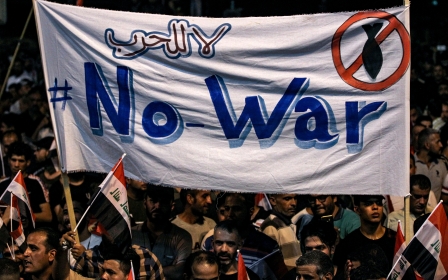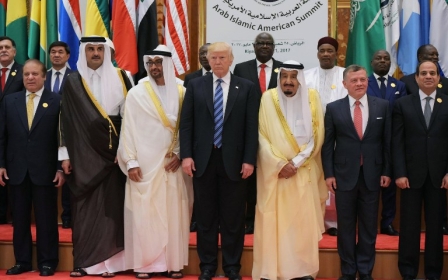How the Arab League helped dissolve the Palestinian question

As one Gulf state after another embraces formal ties with Israel, some have looked to the Arab League to condemn normalisation. Yet to understand why the league will do nothing of the sort, one has to go back to its founding.
The League of Arab States was founded in 1945 at the instigation and planning of Britain to protect British imperial interests.
The British made sure that the Palestine question was subcontracted to the independent Arab states to absolve itself of the responsibility for what it had wrought in the country
The British made sure that the Palestine question was subcontracted to the independent Arab states to absolve itself of responsibility for what it had wrought in the country. Seventy-five years later, the league has been transformed beyond recognition in most aspects, except in its major role of serving imperial interests.
Following the Palestinian Revolt of 1936-1939, during which the British killed 5000 Palestinians and executed and exiled Palestinian leaders, hostility to Britain was increasing across the Arab East. This manifested more clearly in the April 1941 coup by Rashid Ali Al-Gaylani in Iraq, which the British successfully put down a month later.
In June and July 1941, the British invaded Syria and Lebanon to end the rule of Vichy-France there, which had sent military assistance to Rashid Ali in the spring. The defeat of the Vichy-French forced the exiled De Gaulle to grant independence to Syria and Lebanon in 1943. This ensured that Greater Syria, Iraq, Egypt and the Arabian Peninsula fell under full British imperial control even before the war’s end.
New MEE newsletter: Jerusalem Dispatch
Sign up to get the latest insights and analysis on Israel-Palestine, alongside Turkey Unpacked and other MEE newsletters
However, the realisation that the calamity they had visited on the Palestinians by sponsoring the Zionist colonial-settler project would haunt the British for the foreseeable future, coupled with the increase in popular anti-British sentiment across the region drove London to consider how to ensure continued British imperial hegemony after the war: the project of supporting some form of Arab "unity".
This would ensure the end of any influence that Britain’s historic rival, France, would still have in the Arab East, fortify British interests against a potential Soviet threat to the oil of the Arabian Peninsula, and subcontract the management of Palestine to this emergent Arab unity.
Arab unity
The British conquest of Syria and Lebanon was the crucial inaugural step for this plan. Hashemite Iraq sponsored the earliest efforts of this projected unity in alliance (and rivalry) with Transjordan’s Hashemite ruler Amir Abdullah.
Abdullah had designs to become the king of Greater Syria since WWI and hoped that the new British imperial plan would realise his ambitions. It did not; however, he was to reach an agreement with the Zionists to take over the central and eastern part of Palestine in 1948, over which he declared himself king.
The Syrians and Lebanese were committed to republican regimes. The historical rivalry of the al-Sauds with the Hashemites meant that they opposed Abdullah’s plans; and King Farouk of Egypt worried about Iraqi and Hashemite hegemony, and was hostile to the Saudis with whom Egypt went to war in the 19th century.
Farouk insisted that Egypt lead the emerging Arab unity.
As a result, the project for the unification of Syria and Iraq was abandoned, and even any form of federalism amongst these states was seen as threatening the independence and sovereignty of the ruling dynasties.
Only Syria supported full unification. A meeting in Alexandria, in accordance with British plans, in October 1944 hammered out a protocol, which was diluted further in the final pact the Arab states adopted as the basis for founding the League of Arab States in March 1945. Saudi Arabia, Egypt, Syria, Lebanon, Transjordan and Yemen were the founding members, as was Palestine, represented by the Palestinian leader Musa al-‘Alami.
Article two of the pact stipulated that "the purpose of the League is to draw closer the relations between member States and co-ordinate their political activities with the aim of realizing a close collaboration between them, to safeguard their independence and sovereignty..."
It also included a special Annex about Palestine: “it was on the basis of the recognition of her independence that the Covenant of the League of Nations determined a system of government for [Palestine]. Her existence and her independence among the nations can, therefore, no more be questioned de jure than the independence of any of the other Arab States…the Council of the League should designate an Arab delegate from Palestine to participate in its work until this country enjoys actual independence."
By adopting Palestine, the league essentially spared the British any responsibility for what would befall the country in the future. The league was now ready to serve all the interests that Britain had set for it.
Nasser's anti-imperial agenda
As British influence was replaced by American imperial interests in the 1950s, the rise of Gamal Abd al-Nasser and other Arab leftist regimes in the 1950s and 1960s subverted the foundational commitments of the league in the interest of an anti-imperial agenda.
The rise of Nasser and other Arab leftist regimes in the 1950s and 1960s subverted the foundational commitments of the league in the interest of an anti-imperial agenda
This was something Arab rulers serving the West fought tooth and nail until they won the day after the 1967 defeat. During the heyday of Nasser’s power, the league founded the Palestine Liberation Organization (PLO) in 1964 as the main representative organ of the Palestinian people. King Hussein of Jordan, who by the mid 1960s had strengthened his regime’s clandestine friendship and alliance with the Israelis started by his grandfather Amir Abdullah in the 1920s, challenged the PLO’s representative role constantly.
The league’s nominal commitment to Palestine was formalised in 1974 when it recognised the PLO as the “sole legitimate representative of the Palestinian people” and forced Hussein to acquiesce in the new decision. The idea was to steer the PLO slowly away from revolutionary politics and bring it into an accommodation with the US and Israel.
Late Egyptian President Anwar Sadat and his Camp David peace agreement with Israel in 1979 were seen as premature, and there were concerns that Sadat’s actions, taken without consultation with the league, might have weakened its efforts to realise US plans for the region.
The League's original agenda
The league immediately suspended Egypt’s membership and imposed sanctions and a boycott of the country. Arab states cut off diplomatic relations with Egypt and recalled their ambassadors. The league moved its headquarters to Tunis and chose a Tunisian to become its secretary general, a position occupied exclusively by Egyptians since 1945.
Sadat rejected the league’s decision, froze all its financial assets totalling $43m in Egyptian banks, impounded its archives housed in the league’s buildings, and barred its Egyptian staff from moving to Tunis. Egyptian security “conducted personal searches of some officials”, including Abdel Hasan Zalzala, the Iraqi assistant secretary general for economic affairs, before they were allowed to leave Cairo.
In August 1981, Saudi Crown Prince Fahd bin Abdulaziz decided that the moment was opportune to push the league’s original agenda. He unveiled his plan (known as the Fahd Plan) for Arab recognition of Israel in exchange for Israeli withdrawal to the pre-June 1967 borders and the establishment of a Palestinian state led by the PLO, a plan that included slightly better conditions than Sadat’s 1979 deal, which only included some form of local autonomy for the West Bank and Gaza.
In the meantime, as the Americans and the Israelis had neutralised Egypt, Israel acquired a free hand to invade Lebanon and destroy the PLO’s military forces. It invaded the country in 1978 and again in 1982, when it defeated the PLO by the end of the summer.
Upon the PLO's defeat, the Americans announced on 1 September 1982 the Reagan Plan, which insisted that only a restoration of Jordanian control over the West Bank with non-PLO representation in some confederal form would be acceptable, under which the Palestinians would acquire a measure of autonomy but not independence.
Reagan's plan
The Arab League meeting in Fez on 6-9 September that year countered the Americans by adopting the Fahd Plan (Fahd had become king in the meantime) officially as a basis for “peace” with Israel. King Hussein, as eager as his grandfather was to deprive the Palestinians of independence, declared his support for the Reagan Plan on 14 September 1982.
The Saudis, most concerned about the Iranian revolutionary threat to their regime, sought to gain Yasser Arafat’s endorsement of a modified version of the Reagan Plan, and wanted him to bring Egypt back into the Arab fold. Arafat obliged; he immediately began negotiating with Hussein and dispatched a PLO delegation to Cairo in October 1982 for talks, breaking the official Arab boycott of Egypt.
Opposition within the PLO and within Fatah, its largest guerrilla group, was swift, especially when in March 1983 Arafat agreed with Hussein to Reagan’s terms of excluding PLO officials from the joint Jordanian-Palestinian delegation. The Fatah central committee rejected this arrangement and barred Arafat from pursuing it. His plan of serving US interests thwarted, Hussein repudiated Arafat and ended all talks with him.
A revolt against Arafat within Fatah ensued, supported by the Syrian and Libyan governments, and led to clashes between the dissidents and Arafat loyalists. Defeated again, Arafat was finally expelled from Lebanon in December 1983, protected from the Israelis by the French navy.
En route to Tunis, he stopped over in Egypt, embraced the Egyptian President Hosni Mubarak, and inaugurated the steps to rehabilitate Egypt, even though Mubarak’s close ties with the Israelis never wavered.
The Iranian threat
Now that Arafat opened the way, the league’s 1987 summit in Amman decided that each state was free to re-open diplomatic relations with Egypt. The official reasoning was the Saudi insistence on the dangers of the Iranian “threat” to the Arab world, which Saddam’s invasion, at the behest of the Saudis and Gulf oil families, since 1980 failed to neutralise.
The Arab League has clearly fulfilled its imperial obligations very well since its founding in 1945
The Saudis, on behalf of the Americans, insisted that the restoration of Egypt was essential to counter the Iranian threat, even if Egypt was by then an ally of Israel. In support of the Saudis, Jordan, Iraq and the United Arab Emirates openly called for the return of Egypt. Arafat explained that Arab leaders were closing ranks in the face of the Iranian threats. Egypt was restored to the league in 1989, and the league headquarters moved back to Cairo in 1990.
A new era began the same year that would change the exact functions of the league. When the US decided to invade the Arabian Peninsula to eject Iraq from Kuwait at the beginning of 1991, the Arab League had ceased to exist as a deliberative body in the service of western imperial interests, and became the executor of US commands and orders without deliberation.
In the Israeli fold
In the meantime, the PLO, already defeated militarily since 1982, was defeated financially when the Gulf states stopped their financial support due to Arafat’s position on the US invasion of the Arabian Peninsula, and diplomatically once the Soviet Union and the socialist amp collapsed in 1991.
Since the defeat of Saddam Hussein in 2003, the Saudis and other Gulf countries intensified their campaign against the so-called Iranian threat to their regimes, a threat, they insist, that justifies an alliance with Israel.
If Egypt was returned to the Arab fold in the late 1980s as an ally of Israel to confront the Iranian threat, today the Gulf regimes and their US sponsor insist that Israel itself should be brought into that fold, or perhaps, more accurately, that the Arab world should be brought into the Israeli fold.
The fact that the PLO and Arafat were subcontracted by the Saudis and the Americans to restore Egypt in the 1980s is hardly ironic, given the subsequent PLO sellout of Palestinian interests at Oslo in 1993.
Nonetheless, the PLO and the Palestinian Authority, which collaborated since the early 1980s with the Americans, King Hussein, the Gulf regimes and the Israeli occupiers, as part of the imperial agenda to bring down Iran, was taken aback in the last few weeks when it found out that its services were no longer required.
Executor of US will
At last week’s meeting of the Arab foreign ministers, members of the league refused to consider a resolution introduced by the Palestinian Authority's foreign minister to condemn the recent UAE peace deal with Israel.
Soon perhaps, the Arab League will fulfill its final obligation by inviting the Israelis to become a leading member of a new and expanded league
Jordan, Egypt, and the UAE spearheaded the campaign against the PA proposal as Jordan and the UAE had done in 1987 to rehabilitate Egypt. Bahrain’s peace deal this week has already met with adulation from Egypt and more tempered support from Jordan.
The league’s erstwhile commitment to member states "to safeguard their independence and sovereignty" has been rendered without value when the independence of Palestine and Iraq was jettisoned so easily in the interest of imperial and colonial powers.
The Arab League has clearly fulfilled its imperial obligations very well since its founding in 1945, successfully quashing valiant attempts by Egypt's Nasser to make it serve the Arab peoples, and after 1990-91 became a mere executor of US will.
Soon perhaps, it will fulfill its final obligation by inviting the Israelis, to become a leading member of a new and expanded league, thus dissolving the Palestine question, which Britain had bequeathed to it, once and for all.
The views expressed in this article belong to the author and do not necessarily reflect the editorial policy of Middle East Eye.
This article is available in French on Middle East Eye French edition.
Middle East Eye delivers independent and unrivalled coverage and analysis of the Middle East, North Africa and beyond. To learn more about republishing this content and the associated fees, please fill out this form. More about MEE can be found here.



